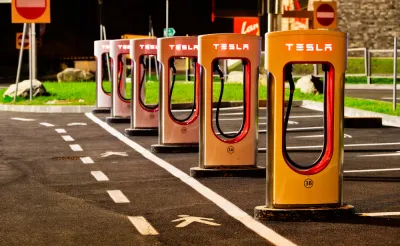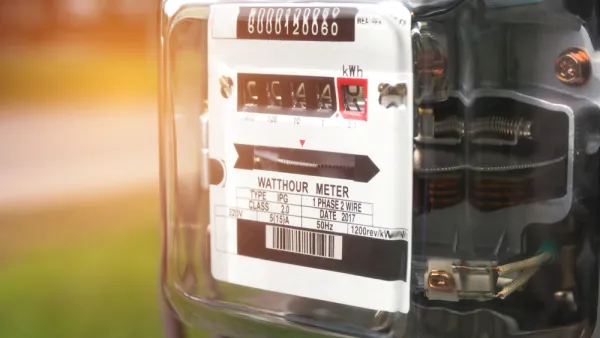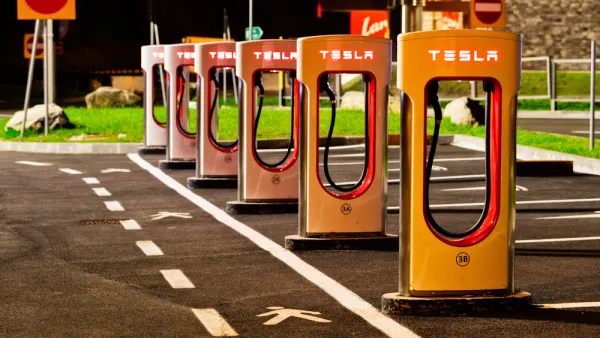The House GOP tax plan, which Trump wanted to name the "Cut, Cut, Cut" bill, was intended to cut taxes, but it's also cutting credits, like the federal $7,500 electric vehicle tax credit. How much would its elimination affect EV sales?

So much for the "Cut, Cut, Cut" bill. It's actual name, the “Tax Cuts and Jobs Act," is also misleading in that it also caps mortgage interest and property tax deductions, which affects the homebuilding industry.
How much the elimination of the Federal Plug-In Electric Drive Vehicle Credit, an Obama-era tax incentive to spur sales of electric vehicles (EVs), would affect the still-nascent EV industry may be a matter of conjecture, but an example from Georgia two years ago is foreboding.
Thanks in great part to the nation's largest state rebate of $5,000 for EV purchases or leases, the Atlanta region ranked "highest in market share for plug-in electric vehicles," reported Andria Simmons of The Atlanta Journal-Constitution in April 2015. After Gov. Nathan Deal (R-Ga.) signed HB 170 in May, which not only ended the rebate but slapped battery-electric vehicles (but not plug-in hybrids) with the nation's highest annual EV registration fee of $200, sales plummeted.
"The market dropped like a rock,” said Don Francis, coordinator of Clean Cities Georgia, in a January 2016 post on Planetizen. "New registrations of electric vehicles have fallen by about 90 percent since the summer of 2015."
Fast forward to current proposal to scrap the federal EV tax credit.
"Advocates have ramped up lobbying efforts to save the credit, which has benefited electric vehicle manufacturers like Tesla," reports Devin Henry for The Hill on Nov. 2. "The credit is limited at the first 200,000 electric vehicles sold by each manufacturer, but no one has yet hit that cap."
“Electrification for vehicles is extremely important for the future of the auto industry, particularly given the fact that as we move towards autonomous, self-driving vehicles, those vehicles will be powered by electric,” said Sen. Gary Peters (D-Mich.), who represents America's automobile manufacturing hub, on Wednesday.
“That tax credit is really important for moving this technology forward.”
The prognosis was more dire in a report in Bloomberg News on Thursday:
“That will stop any electric vehicle market in the U.S., apart from sales of the highly expensive Tesla Model S,” said Xavier Mosquet, senior partner at consultant Boston Consulting Group, who authored a study on the growth of battery powered vehicles. “There’s no Tesla 3, no Bolt, no Leaf in a market without incentives.”
A post on Vetr Blog, a stock-watch website, observed Thursday, "Tesla's Having The Worst Day Ever As GOP Tax Plan Calls For Axing Electric Car Credit."
Another good read on the loss of the credit and what it means to EV manufacturers is by Bill Vlasic in The New York Times on Nov. 2. However, he notes that even with the the federal and state credits and other perks, "sales of electrified vehicles remain a tiny fraction of the overall market."
EVs would not be the only clean energy industry sector that would take a hit under the GOP tax plan, adds Henry for The Hill.
It would repeal an inflation increase for renewable energy production tax credits, a move that would increase taxes for power sources like wind, solar, biomass, geothermal, hydropower and others.
Will tax plan affect your commuter benefits?
If you use commuter checks to buy your transit passes or tickets or claim parking expenses as a pre-tax benefit, there is one change to note, but thanks to the below-mentioned GOP Congress members, you'll still be able to enjoy benefits, assuming your employer continues to offer them. That's the catch, as that's what that one change may impact. POLITICO's Tanya Snyder explains on Nov. 3 in Morning Transportation:
While employers would still be allowed to either give employees untaxed transportation money as a fringe benefit or to deduct it as pre-tax income from their paychecks, the businesses themselves would not be able to write off the expense.
The cap for the transit and parking subsidies (or pre-tax contributions) would still each be $260 per month for 2018. Several well-positioned urban Republicans, including Reps. Pete King of New York, Barbara Comstock of Virginia and Mike Bishop of Michigan, worked hard to keep the benefit.
Hat tip to Len Conly.
FULL STORY: GOP tax bill ends electric vehicle tax credit, overhauls other energy taxes

Analysis: Cybertruck Fatality Rate Far Exceeds That of Ford Pinto
The Tesla Cybertruck was recalled seven times last year.

National Parks Layoffs Will Cause Communities to Lose Billions
Thousands of essential park workers were laid off this week, just before the busy spring break season.

Retro-silient?: America’s First “Eco-burb,” The Woodlands Turns 50
A master-planned community north of Houston offers lessons on green infrastructure and resilient design, but falls short of its founder’s lofty affordability and walkability goals.

Test News Post 1
This is a summary

Analysis: Cybertruck Fatality Rate Far Exceeds That of Ford Pinto
The Tesla Cybertruck was recalled seven times last year.

Test News Headline 46
Test for the image on the front page.
Urban Design for Planners 1: Software Tools
This six-course series explores essential urban design concepts using open source software and equips planners with the tools they need to participate fully in the urban design process.
Planning for Universal Design
Learn the tools for implementing Universal Design in planning regulations.
EMC Planning Group, Inc.
Planetizen
Planetizen
Mpact (formerly Rail~Volution)
Great Falls Development Authority, Inc.
HUDs Office of Policy Development and Research
NYU Wagner Graduate School of Public Service



























